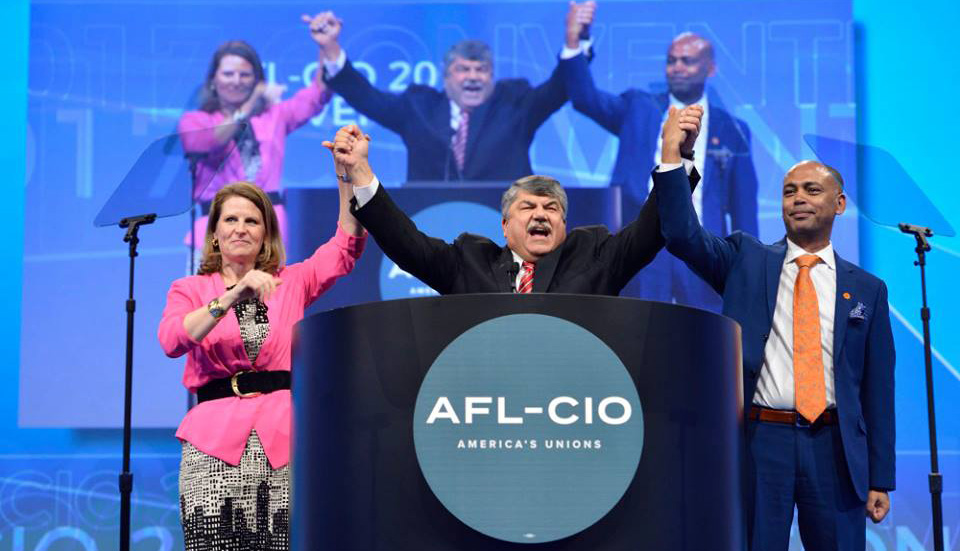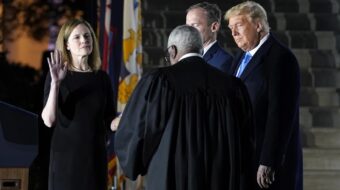
ST. LOUIS—One of several messages organized labor is carrying to workers and voters nationwide is that Donald Trump isn’t keeping his promises.
In an October 22 press conference at the opening of the AFL-CIO convention in St. Louis, federation President Richard Trumka ran down a list of promises the Manhattan mogul-turned-GOP president uttered on the campaign trail last year, from more construction spending to blasting so-called free trade.
“We give them (workers) the facts,” said Trumka of what Trump has promised. “Here’s what he’s promised. Here’s what he’s done. And his promises left people in the lurch.”
Unions are already carrying that message to their members and families, Trumka said, and will continue to do so through the rest of this year and the 2018 election campaign.
“He promised infrastructure. Nothing. He promised to bring manufacturing back. Didn’t happen.”
Instead, what Trump brought factory workers was the “Christmas wish list,” from CEOs of major firms, who were briefly Trumka’s colleagues on a short-lived manufacturing advisory council for Trump, before they all quit over his response to the fatal neo-Nazi riot in Virginia.
The corporate wish list is being granted, in such things as delaying job safety and health rules curbing worker exposure to silica and beryllium, both cancer-causing substances. And their wish list is being granted, Trumka said, also by rolling back the Obama-era increase in eligibility for overtime pay.
“That sobering education gets people to come back across the bridge,” Trumka said of workers who voted for Trump, citing evidence through public opinion polls showing the president, just 10 months in office, has record unpopularity ratings. 61 percent of those questioned, meanwhile, say they support unions.
But whether such an education campaign will succeed is still an open question. Many of Trump’s supporters are die-hards, surveys and questionnaires show, regardless of the facts. And there’s another hurdle, Trumka admitted: rising bitterness against a system that workers feel, rightly, is tilted against them.
Repeating statistics he often cites, Trumka pointed to a survey of millennials by Harvard University. “They’re the first generation that has seen their parents suffer lost homes, pay, and pensions, and who work in a globalized worldwide economy with limited prospects.”
Only 30 percent of those polled believe democracy is important, Trumka said, and 24 percent think it’s bad for them. “They’re beginning to equate democracy and capitalism with poverty, low wages, and insecurity,” he added.
“So we’re talking about changing the rules so everybody gets a chance,” he said, “in an economy that works for workers.”
But the message isn’t a top-down one, Trumka contended. He said it’s a product of “thousands and thousands” of conversations the federation had with its members. “We say: ‘This is your union. What do you need us to do?’”
The answer that came back was to create an economic platform that is so strong that it would make the national right-wing push to enact so-called right to work laws—which labor and workers call “right to work for less” laws—“irrelevant.”
One way is through collective action, Trumka contended. He cited recent mass movements like Fight for $15 and the Women’s March. Workers and unionists made up big chunks of those movements. They were direct sponsors of the Fight for $15, and at the massive women’s demonstrations in January, the AFL-CIO contingent carried signs declaring: “Union woman. Will strike if provoked.”
People “will understand that when we come together, we’ll be stronger,” Trumka said. He drew special attention to the fact that “collectivism is on the rise in the U.S.” He argued, “Whether it’s political action, legislation, or collective bargaining, you’ll see a unity” that did not exist before.
That unity will also be manifest in a political platform Trumka said labor will adopt at the convention and then present to political hopefuls. Those who support it will get workers’ support. Those that don’t, won’t.
The labor movement has been deeply involved in national and local election campaigns throughout its history. Trumka was asked whether this will be the case in 2018 when the entire House is up for re-election along with a third of the Senate. If Democrats tip either the House or the Senate they can block any legislation supported by President Trump, seen as the most anti-labor president in recent U.S. history.
Trumka did not commit to labor’s automatic support for Democrats opposing Republicans. “We are developing and going to put forward a Workers’ Bill of Rights,” he declared, “and our support will only go to people who back that bill of rights. If a candidate, regardless of party, can’t do that, we’ll say, ‘That’s nice, good luck’ and move on to support someone else.”
Trumka said this week many union members who are running for office on all levels are coming forward at the convention. “We are going to push hard to increase the number of workers elected to office,” he said after the press conference.
Also asked afterwards if the federation would reject people who backed perhaps nine out of ten of labor’s issues but not all of the points on the bill of rights, his answer, with a smile, was, “We’ll push them on the tenth.”
Trumka did not elaborate, but said labor’s 2018 election push would be “unprecedented in breadth, scope and unity. We will approach these elections more united than ever before,” concentrating on the issues, he said. In the past, different unions have sometimes supported different candidates.
Trumka attributed the large Republican vote among workers as a whole to anxiety and fear among workers over their stagnating wages and their inability to make gains while Wall Street and the wealthy were doing so well. “Some people,” he said, “were willing to try anything to see if things would get better.” But, he added, “Many who backed Trump are realizing now the huge gap between the promises he made and the reality of his policies.
“Our basic approach is to put forward our workers’ agenda and fight to have people come over to that agenda,” he said, “and that is what we see happening.”













Comments